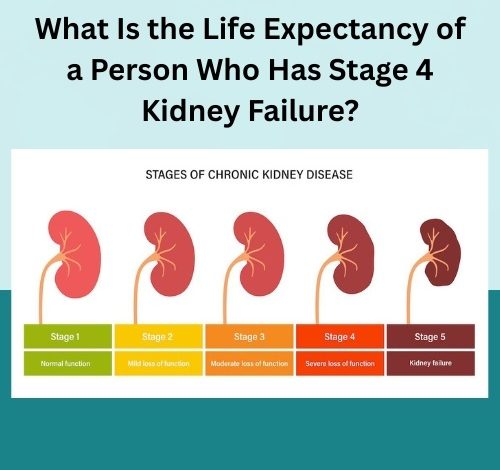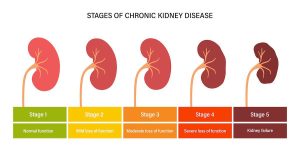What Is the Life Expectancy of a Person Who Has Stage 4 Kidney Failure?

Kidney failure is a progressive and life-altering condition that affects millions of people worldwide. Among its various stages, stage 4 kidney failure represents a critical point where the kidneys are severely damaged and functioning at just 15–29% of their normal capacity. This stage is often accompanied by noticeable symptoms and requires immediate medical attention. A common and pressing question at this stage is: “What is the life expectancy of a person with stage 4 kidney failure?”
This article explores the factors that affect life expectancy, available treatment options, lifestyle modifications, and what patients and families can do to improve quality of life during this advanced stage of chronic kidney disease (CKD).
Understanding Stage 4 Kidney Failure
To fully grasp the implications of life expectancy, it’s essential to understand what stage 4 kidney failure actually means.

Chronic kidney disease is categorized into five stages based on glomerular filtration rate (GFR), which measures how well the kidneys are filtering waste from the blood.
- Stage 1: Kidney damage with normal GFR (90+)
- Stage 2: Mild loss of kidney function (GFR 60–89)
- Stage 3: Moderate loss (GFR 30–59)
- Stage 4: Severe loss (GFR 15–29)
- Stage 5: End-stage kidney disease (GFR <15), often requiring dialysis or transplant
In stage 4, the kidneys are functioning at a fraction of their capacity. Patients often experience complications like anemia, high blood pressure, bone disease, and electrolyte imbalances. If left unmanaged, stage 4 will typically progress to stage 5, also known as end-stage renal disease (ESRD).
Related Article: Can a Failed Kidney Go Back to Normal?
Average Life Expectancy at Stage 4 Kidney Failure
There is no one-size-fits-all answer to life expectancy, as it can vary widely depending on a host of factors. However, studies and clinical data provide general estimates based on patient profiles and treatment status.
1. Without Dialysis or Transplant
If stage 4 kidney failure progresses to stage 5 without dialysis or a transplant, the life expectancy can range from a few months to a couple of years. The progression speed largely depends on age, overall health, comorbidities (like diabetes or heart disease), and how well the condition is managed.
For elderly individuals, especially those over 75, untreated stage 5 kidney failure may result in a life expectancy of 6 months to 1 year after progression.
Related Article: What Are the Four Common Causes of Kidney Damage?
2. With Conservative Management
Some patients, particularly elderly or those with severe comorbidities, may opt for conservative management instead of dialysis. This approach focuses on symptom relief and quality of life rather than aggressive intervention. Life expectancy under conservative care varies but typically ranges between 6 months to 2 years, depending on the rate of decline and symptom burden.
3. With Proper Medical Treatment
When managed with medication, diet, and close monitoring, some stage 4 patients may live for many years without dialysis. According to the United States Renal Data System (USRDS), the average life expectancy for someone 60 years old with stage 4 kidney failure can be 5–10 years, depending on the rate of decline and health maintenance.
Related Article: Can Kidney Restore Supplements Reverse Damage? Here’s What Science Says
Key Factors That Influence Life Expectancy
Understanding how long a person can live with stage 4 kidney failure requires evaluating several crucial elements:
1. Age
Age plays a significant role in life expectancy. Younger individuals tend to have better outcomes because they are more likely to tolerate treatments, follow dietary and medical advice, and have fewer comorbidities.
2. Comorbid Conditions
The presence of other chronic illnesses—especially diabetes, hypertension, heart disease, or autoimmune disorders—can greatly accelerate the decline of kidney function and decrease life expectancy.
Related Article: What Are the Signs That Your Kidneys Have Recovered from Failure?
3. Rate of Kidney Decline
Some patients lose kidney function slowly over years, while others progress quickly within months. Those with a slower decline can live longer with proper management.
4. Response to Treatment
Patients who respond well to blood pressure medication, anemia treatments, and dietary changes tend to have improved life expectancy.
5. Lifestyle Choices
Factors like smoking, excessive alcohol use, poor diet, and sedentary lifestyle can negatively affect kidney health and overall longevity.
6. Access to Care
Regular checkups with a nephrologist, timely lab tests, and adherence to treatment plans can significantly improve outcomes and delay progression to stage 5.
Related Article: Can People with Chronic Kidney Disease Eat Apples?
Symptoms of Stage 4 Kidney Failure
As kidney function worsens, waste and fluids accumulate in the body, leading to noticeable symptoms. Some common symptoms at this stage include:
- Fatigue and weakness
- Swelling in hands, feet, or face (edema)
- Muscle cramps
- Shortness of breath
- Nausea and vomiting
- Metallic taste in the mouth
- Persistent itching
- Difficulty concentrating
- High blood pressure
- Loss of appetite
Managing these symptoms effectively can improve quality of life and possibly extend life expectancy.
Treatment Options to Improve Life Expectancy
While stage 4 is a serious condition, medical intervention can significantly improve prognosis.
1. Medications
Doctors may prescribe:
- ACE inhibitors or ARBs to manage blood pressure
- Phosphate binders to prevent bone damage
- Erythropoietin to treat anemia
- Diuretics to control swelling
- Vitamin D supplements
2. Dietary Modifications
A renal diet is key to reducing kidney workload. A renal diet typically includes:
- Low protein intake to reduce nitrogen waste
- Low sodium to control blood pressure
- Low phosphorus and potassium to protect bones and prevent heart issues
- Adequate calories to prevent malnutrition
Working with a renal dietitian can dramatically improve patient outcomes.
Related Article: What is a Suggested Diet for Chronic Kidney Disease?
3. Lifestyle Changes
- Quit smoking
- Exercise moderately
- Limit alcohol
- Stay hydrated but monitor fluid intake
- Manage blood sugar if diabetic
4. Preparing for Dialysis or Transplant
Patients in stage 4 are encouraged to begin planning for renal replacement therapy such as:
- Hemodialysis
- Peritoneal dialysis
- Kidney transplant
Early preparation improves transition and outcomes.
Slowing the Progression to Stage 5
The goal in stage 4 is to delay or prevent the need for dialysis or transplant. Here are strategies proven to slow progression:
1. Strict Blood Pressure Control
Maintain a blood pressure below 130/80 mmHg, often using medications like ACE inhibitors.
2. Diabetes Management
Keep HbA1c below 7% to reduce kidney damage from high blood sugar.
3. Treat Infections Promptly
Even a urinary tract infection can cause significant kidney stress in stage 4.
4. Monitor Kidney Function Regularly
Frequent lab tests to check GFR, creatinine, potassium, phosphorus, and albumin levels help detect deterioration early.
When to Start Dialysis
Most people start dialysis when their GFR falls below 15 and symptoms become severe. However, early preparation and access to a vascular access site or peritoneal catheter can smooth the transition.
While dialysis does not cure kidney failure, it can significantly extend life—sometimes by 5, 10, or even 20 years—depending on age and health status.
Emotional and Psychological Considerations
Living with stage 4 kidney failure is not only a physical burden but also an emotional one. Patients may face:
- Depression
- Anxiety
- Fear of the unknown
- Isolation
Support from family, friends, counselors, or renal social workers can help patients cope. Advance care planning and palliative care consultations may also be appropriate in certain cases to ensure the patient’s wishes are respected.
Improving Quality of Life in Stage 4
Regardless of how long someone may live with stage 4 kidney failure, quality of life remains paramount. Here are ways to enhance it:
- Stay active with low-impact activities like walking or yoga
- Eat nourishing, kidney-friendly meals
- Engage in hobbies and social activities
- Keep a routine sleep schedule
- Use support groups or therapy
- Track symptoms and medications carefully
FAQs
Can someone live 10 years with stage 4 kidney failure?
Yes, particularly younger individuals or those who carefully manage their condition and slow the decline to stage 5. Proper medication, diet, and lifestyle changes are crucial.
Is stage 4 kidney failure reversible?
No, stage 4 CKD is not reversible. However, progression can be slowed, and symptoms can be managed effectively with appropriate treatment.
Is dialysis inevitable at stage 4?
Not necessarily. Some patients maintain sufficient kidney function for years without needing dialysis. However, planning for dialysis or transplant is advisable.
Final Thoughts
The life expectancy of a person with stage 4 kidney failure depends on a wide range of factors including age, underlying health conditions, rate of kidney decline, and adherence to treatment. While the statistics may seem sobering, there is hope. With the right medical team, lifestyle changes, and personal commitment, many patients continue to live meaningful, fulfilling lives for years after diagnosis.
If you or a loved one has been diagnosed with stage 4 kidney failure, it’s important to act proactively—engage in medical care, follow dietary guidelines, manage comorbidities, and prepare emotionally and logistically for what’s ahead.




